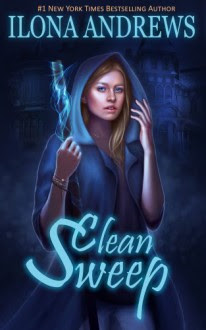 |
| 4.5 stars out of 5 |
One snowy night Arthur Leander, a famous actor, has a
heart attack onstage during a production of King Lear. Jeevan Chaudhary,
a paparazzo-turned-EMT, is in the audience and leaps to his aid. A
child actress named Kirsten Raymonde watches in horror as Jeevan
performs CPR, pumping Arthur's chest as the curtain drops, but Arthur is
dead. That same night, as Jeevan walks home from the theater, a
terrible flu begins to spread. Hospitals are flooded and Jeevan and his
brother barricade themselves inside an apartment, watching out the
window as cars clog the highways, gunshots ring out, and life
disintegrates around them.Twenty years
later, Kirsten is an actress with the Traveling Symphony. Together,
this small troupe moves between the settlements of an altered world,
performing Shakespeare and music for scattered communities of survivors.
Written on their caravan, and tattooed on Kirsten's arm is a line from
Star Trek: "Because survival is insufficient." But when they arrive in
St. Deborah by the Water, they encounter a violent prophet who digs
graves for anyone who dares to leave.Spanning
decades, moving back and forth in time, and vividly depicting life
before and after the pandemic, this suspenseful, elegiac novel is rife
with beauty. As Arthur falls in and out of love, as Jeevan watches the
newscasters say their final good-byes, and as Kirsten finds herself
caught in the crosshairs of the prophet, we see the strange twists of
fate that connect them all. A novel of art, memory, and ambition,
Station Eleven tells a story about the relationships that sustain us,
the ephemeral nature of fame, and the beauty of the world as we know it.
Because survival is insufficient
I am
vasilating between 4 and 5 stars for this novel, one of the best
post-apocalyptic stories that I have encountered. Being a fan of
Shakespeare, I had to love it, especially as I am also a fan of Star
Trek. The references to both made it irresistible.
I also can appreciate the nods to Stephen King’s
The Stand, which is one of his most loved books. However, I prefer
Station Eleven
because it doesn’t draw the lines between good and evil quite as
starkly as King did, and because it acknowledges that this pandemic is a
worldwide problem and doesn’t limit the story to the United States.
I
am struck by all the links between the actor, Arthur, and the role he
was acting, King Lear. Lear had three daughters, Arthur has three
ex-wives. In Lear, everyone linked back to the King. Everyone of
significance in
Station Eleven links back to Arthur: Clark, his best friend; Miranda (
The Tempest?),
his first wife; Tyler/The Prophet, his son; Kirsten, one of the child
actresses on stage the night that he died. It is Arthur’s funeral which
draws all of them (except Miranda) to North America just before the
pandemic puts an end to air travel. Arthur and Tyler both pursue lives
focused on their own vision, letting others fall by the wayside as they
go. The Prophet, like so many religious leaders before him (Jim Jones,
David Koresh, etc.) claims the right to multiple wives. So did his
father, but he generally divorced one upon choosing the next. And I
cannot ignore that Arthur dies at about the same age as Shakespeare
himself, fifty two.
I found it hopeful that so many of the
characters devoted themselves to preserving knowledge—The Traveling
Symphony, with their attached Shakespearean repertory, Clark’s Museum of
the world before the pandemic, Miranda’s Dr. Eleven comic books that
Kirsten carefully preserves. In fact, those comic books represent holy
scripture to both Kirsten and to Tyler, with much different results.
At
the book’s end, I was left feeling uplifted rather than depressed. I
shall have to read it again, in a couple of years, making this a special
book for me.
Read by
candlelight to fill a square on my
Halloween Book Bingo Card.


















